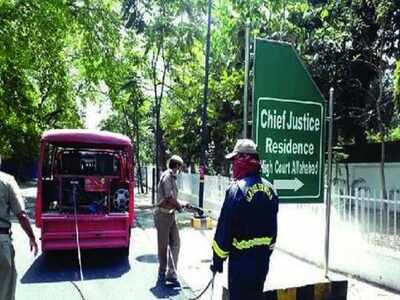
PRAYAGRAJ: The Allahabad high court has quashed several government orders disengaging the district government counsels (DGCs) working in several district courts across the state.
However, while giving this judgment, the court made it clear that quashing of such orders did not result in re-engagement of the petitioners or their continuance on the same post. The matter shall be decided by authorities concerned afresh, keeping in view the observations made in this judgment as well as legal provisions within a period of four month, the court further directed.
Allowing several petitions filed by Shyam Narayan Yadav and others, a division bench comprising Justice Bala Krishna Narayana and Justice Prakash Padia held that the GOs under challenge were bad in law for “total non-application of mind and the order being supported by no reason whatsoever, hence, it would render the order passed as arbitrary”.
The court, while allowing the petitions, observed: “In the manner of appointment of Government Law Officer/Counsel/Pleader, it is the duty of the Government to act in a fair, reasonable, objective and in a non discriminative manner.” The court also held that that the government does not have an “absolute right” to terminate such appointments at any time without specifying any reason and the same will be violative of Article 14 (right to equality) and Article 16 (equality of opportunity in the matter of public employment) of the Constitution.
Elaborating the procedural aspect, the court said, “It is only when government counsels work or conduct is found to be unsatisfactory then it is so reported to the government for appropriate orders. If the report is satisfactory, the rule requires that he may be furnished with a deed of engagement for a term not exceeding three years.”
The petitioners’ contention was that as per law, district judge of the district court concerned recommends the name of counsels to the state government after appreciating their work.
According to the petitioners, the concerned district judges had appreciated the quality of their work, including their knowledge, professional conduct and public reputation. Nevertheless, the government had refused to renew their term “without assigning any reasons” as to why the recommendations made by the district judges were not accepted.
However, while opposing the petition, the state counsel had argued that DGCs do not enjoy any statutory right in respect to the renewal of their tenure, and on the other hand the state government enjoys discretionary power in this regard.
This judgment was delivered on April 29.
However, while giving this judgment, the court made it clear that quashing of such orders did not result in re-engagement of the petitioners or their continuance on the same post. The matter shall be decided by authorities concerned afresh, keeping in view the observations made in this judgment as well as legal provisions within a period of four month, the court further directed.
Allowing several petitions filed by Shyam Narayan Yadav and others, a division bench comprising Justice Bala Krishna Narayana and Justice Prakash Padia held that the GOs under challenge were bad in law for “total non-application of mind and the order being supported by no reason whatsoever, hence, it would render the order passed as arbitrary”.
The court, while allowing the petitions, observed: “In the manner of appointment of Government Law Officer/Counsel/Pleader, it is the duty of the Government to act in a fair, reasonable, objective and in a non discriminative manner.” The court also held that that the government does not have an “absolute right” to terminate such appointments at any time without specifying any reason and the same will be violative of Article 14 (right to equality) and Article 16 (equality of opportunity in the matter of public employment) of the Constitution.
Elaborating the procedural aspect, the court said, “It is only when government counsels work or conduct is found to be unsatisfactory then it is so reported to the government for appropriate orders. If the report is satisfactory, the rule requires that he may be furnished with a deed of engagement for a term not exceeding three years.”
The petitioners’ contention was that as per law, district judge of the district court concerned recommends the name of counsels to the state government after appreciating their work.
According to the petitioners, the concerned district judges had appreciated the quality of their work, including their knowledge, professional conduct and public reputation. Nevertheless, the government had refused to renew their term “without assigning any reasons” as to why the recommendations made by the district judges were not accepted.
However, while opposing the petition, the state counsel had argued that DGCs do not enjoy any statutory right in respect to the renewal of their tenure, and on the other hand the state government enjoys discretionary power in this regard.
This judgment was delivered on April 29.
Quick Links
Kerala Coronavirus Helpline NumberHaryana Coronavirus Helpline NumberUP Coronavirus Helpline NumberBareilly NewsBhopal NewsCoronavirus in DelhiCoronavirus in HyderabadCoronavirus in IndiaCoronavirus symptomsCoronavirusRajasthan Coronavirus Helpline NumberAditya ThackerayShiv SenaFire in MumbaiAP Coronavirus Helpline NumberArvind KejriwalJammu Kashmir Coronavirus Helpline NumberSrinagar encounter
Get the app








